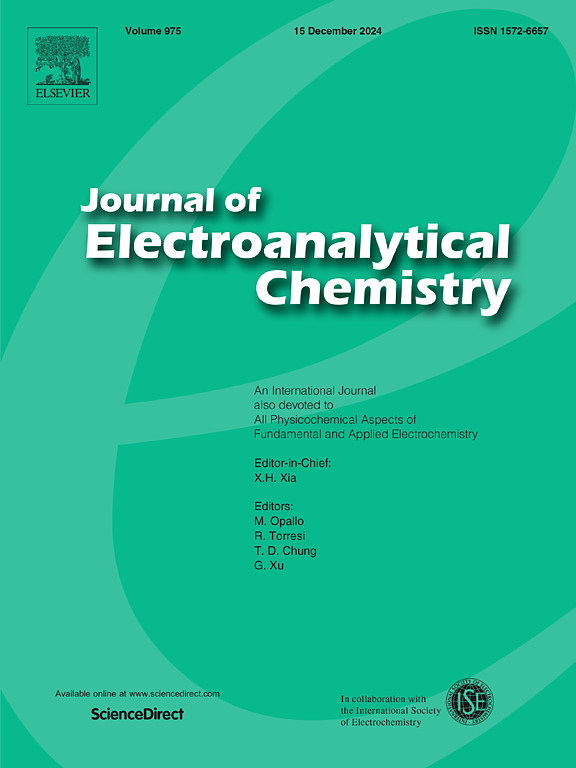Unravelling The charge storage mechanism in V2O5 nanorods through Systematic structural and electrochemical study
IF 4.1
3区 化学
Q1 CHEMISTRY, ANALYTICAL
引用次数: 0
Abstract
In the present research, we report on vanadium pentoxide (V2O5) nanorods, fabricated via a simple sol–gel route, which displayed exceptional performance as electrode material for supercapacitor applications. Rigorous structural and morphological analyses were employed to gain a comprehensive understanding of the key physical parameters involved. Subsequently, standard electroanalytical techniques, including scan rate study (CV), galvanostatic charging/discharging (GCD), and electrochemical impedance spectroscopy (EIS), were used for detailed electrochemical assessment and to investigate the influence of physical parameters on electrochemical attributes. The investigated electrode material displayed a specific capacitance of 365F g−1 at a current density of 1 A g−1 in 2 M NaOH electrolyte. The nominated electrode also exhibited an outstanding energy density of 12.67 Wh kg−1 at an adequate power density of 247.15 W kg−1, with an impressive capacitance retention of 91 % over 5000 cycles. The choice of material, along with the nanostructured design featuring rod-like morphology, played a crucial role in achieving superior performance as a supercapacitor electrode. These insights are vital for investigating structural and morphological changes in V2O5-based materials during electrochemical operations.
通过系统的结构和电化学研究揭示 V2O5 纳米棒的电荷存储机制
在本研究中,我们报告了通过简单的溶胶-凝胶路线制备的五氧化二钒(V2O5)纳米棒,该纳米棒作为超级电容器应用的电极材料显示出卓越的性能。为了全面了解其中的关键物理参数,研究人员采用了严格的结构和形态分析。随后,采用标准电分析技术,包括扫描速率研究(CV)、电静态充放电(GCD)和电化学阻抗光谱(EIS),进行了详细的电化学评估,并研究了物理参数对电化学属性的影响。在 2 M NaOH 电解液中,电流密度为 1 A g-1 时,所研究的电极材料显示出 365F g-1 的比电容。在 247.15 W kg-1 的足够功率密度下,提名电极还显示出 12.67 Wh kg-1 的出色能量密度,在 5000 次循环中电容保持率高达 91%。材料的选择以及具有棒状形态的纳米结构设计在实现超级电容器电极的卓越性能方面发挥了至关重要的作用。这些见解对于研究基于 V2O5 的材料在电化学操作过程中的结构和形态变化至关重要。
本文章由计算机程序翻译,如有差异,请以英文原文为准。
求助全文
约1分钟内获得全文
求助全文
来源期刊
CiteScore
7.80
自引率
6.70%
发文量
912
审稿时长
2.4 months
期刊介绍:
The Journal of Electroanalytical Chemistry is the foremost international journal devoted to the interdisciplinary subject of electrochemistry in all its aspects, theoretical as well as applied.
Electrochemistry is a wide ranging area that is in a state of continuous evolution. Rather than compiling a long list of topics covered by the Journal, the editors would like to draw particular attention to the key issues of novelty, topicality and quality. Papers should present new and interesting electrochemical science in a way that is accessible to the reader. The presentation and discussion should be at a level that is consistent with the international status of the Journal. Reports describing the application of well-established techniques to problems that are essentially technical will not be accepted. Similarly, papers that report observations but fail to provide adequate interpretation will be rejected by the Editors. Papers dealing with technical electrochemistry should be submitted to other specialist journals unless the authors can show that their work provides substantially new insights into electrochemical processes.

 求助内容:
求助内容: 应助结果提醒方式:
应助结果提醒方式:


